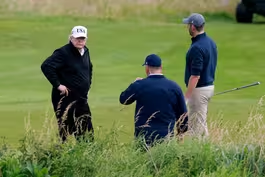
July 26, 2025 - PBS News Weekend full episode
7/26/2025 | 26m 45sVideo has Closed Captions
July 26, 2025 - PBS News Weekend full episode
July 26, 2025 - PBS News Weekend full episode
Problems playing video? | Closed Captioning Feedback
Problems playing video? | Closed Captioning Feedback
Major corporate funding for the PBS News Hour is provided by BDO, BNSF, Consumer Cellular, American Cruise Lines, and Raymond James. Funding for the PBS NewsHour Weekend is provided by...

July 26, 2025 - PBS News Weekend full episode
7/26/2025 | 26m 45sVideo has Closed Captions
July 26, 2025 - PBS News Weekend full episode
Problems playing video? | Closed Captioning Feedback
How to Watch PBS News Hour
PBS News Hour is available to stream on pbs.org and the free PBS App, available on iPhone, Apple TV, Android TV, Android smartphones, Amazon Fire TV, Amazon Fire Tablet, Roku, Samsung Smart TV, and Vizio.
Providing Support for PBS.org
Learn Moreabout PBS online sponsorship[Music] Tonight on PBS News Weekend in Gaza, a tipping point as deaths from hunger rise and global pressure builds.
Israel announces it will begin airdrops of humanitarian aid tonight.
Then a big birthday and a big moment for the postal service, 250 years old and now navigating far more than snow, rain, heat, and gloom of night.
and the global debut of a unique boy band featuring two North Korean defectors.
I did think that it would be fascinating to have North Korean defectors trying out something in K-pop cuz you know who doesn't love the story of someone from a humble background chasing their dreams.
[Music] Major funding for PBS News Weekend has been provided by the ongoing support of these individuals and institutions and friends of the NewsHour.
[Music] [Music] This program was made possible by the contributions to your PBS station from viewers like you.
Thank you.
[Music] Good evening.
I'm Lisa Dejardan.
John Yang is away.
A pivotal moment for lives and the conflict in the Middle East as deaths from hunger rise in Gaza.
Today, the Israeli military announced it will begin airdrops of aid and will open more humanitarian corridors to bring in food.
But the UN and aid groups have criticized airdrops as inadequate and dangerous.
The Gaza Health Ministry reported that in the last day, five people died of malnutrition and starvation, including a baby girl.
She's one of 85 children to die of malnutrition over the last three weeks.
The ministry said death also came from above.
At least 42 people in Gaza were killed by gunfire and air strikes, according to Gaza health officials.
Half were shot while waiting for aid.
Earlier today, I spoke with a leading aid worker who is in Gaza.
Rachel Cummings is with Save the Children.
I began by asking what she sees.
The situation in Gaza is catastrophic uh for children and for their families.
We're seeing now a sharp rise in the number of children coming to our clinics who are malnourished.
Very deeply concerned about pregnant women and lactating breastfeeding women coming to our clinic who are malnourished.
And now we hearing of people dying from starvation.
And this is deeply deeply concerning.
We expect now uh an exponential rise in the number of people who are malnourished and at risk of starvation.
You know, just in our clinics in the last two weeks, the first two weeks of July, we've seen the same number as the whole of uh June.
So, this is the rise that we've been fearing for so long.
How about the supplies of food?
I know you've recently been to a market.
And what are you seeing among your own staff in in terms of how they're handling this with their families?
Yeah, all of my staff I have over 200 staff working Palestinians working in Gaza and of course they are all directly impacted by the war.
There is very little if anything now left in the market.
Three of my staff last week fainted in the office and shared with me that they hadn't eaten that whole day.
And most of the staff have shared with me that they worry about going home because they don't have any food to take for their children and they're worried, desperately worried about where their next meal will come from.
One of my staff said to me last week, "We are all walking towards death and nobody is helping us."
Now, that's a desperate situation and that could be multiplied by pretty much everyone in Gaza.
They know what is happening.
They see themselves wasting away.
I see them wasting away on a daily basis.
Now, you have said just in the last day or so that you think this is a tipping point.
What do you mean by that?
It is a tipping point.
So, for many months, we've been talking about the risk of this situation playing out because we know that not enough food has been entering Gaza since March when the blockade was put in place in Gaza.
not enough food, consistent food, safe and dignified distributions haven't been taking place in Gaza.
And there is only so long the body can sustain.
And what we're seeing now, of course, is the weakest dying of starvation.
But what we could see is mass starvation for people across Gaza.
Between January and March, we had between 400 and 600 trucks a day of humanitarian supplies and commercial supplies entering Gaza.
at the moment is less than 100 and for many months it was nothing.
So this is the result of the blockade, humanitarian supplies and food, essential food items not entering Gaza.
And as you said, people have been since the end of May forced into impossible choices of whether to stay hungry and risk their children starving or risk their lives to go and get a bag of flour or a bag of pasta.
This is the situation that we're now facing is absolutely catastrophic.
Do you sense there's a disconnect by those in power?
This is atrocious conditions and yet we continue to get deeper into these conditions.
I've said it many times.
It can't get worse for children.
But actually it does and it gets worse every single day for children.
So there has to be a disconnect.
You know, we need to stop bombing children.
We need to allow children to eat food to sustain life.
So there has to be there is a disconnect between people making decisions, people in power and what is happening for children in Gaza.
What do you think needs to happen now?
This is a dire moment.
The world needs to wake up.
It feels like we've been sleeping or just watching this unfold and yet it's been predicted for months over the course of the whole war.
What could happen?
And we're now reaching, as I said, this tipping point.
So, we need the definitive ceasefire.
We need to stop bombing children.
We need to allow the humanitarian supplies into Gaza, the commercial supplies into Gaza, and we need to be allowed to do our jobs as humanitarian community to reach children who are desperately in need.
You know, save the children, other humanitarian organizations.
We know how to prevent malnutrition.
We know how to treat malnutrition.
We need to be allowed to do our jobs now.
Rachel Cummings from Save the Children, thank you for taking this time to talk to us.
Thank you so much.
In tonight's other news, President Trump says chances of a trade deal with the European Union are improving.
This as the president is in Scotland seen golfing at his resort in Turnbury.
The White House calls it a working visit with Trump set to talk with British Prime Minister Kier Starmer and European Commission President Ursula Vander Lion about trade and US tariffs.
The president sounded cautiously optimistic yesterday.
With the European Union, I think we have a good 50/50 chance.
That's a lot.
What are the sticking points that you Well, I don't want to tell you what the sticking points are, but the sticking points are having to do with maybe 20 different things.
You don't want to listen to all of them.
Protests and anger have surrounded Mr. Trump's trip to Scotland, including this scene in Aberdine.
An anti-Trump group hosted a kind of protest festival there.
While in the country, the president will also attend a ribbon cutting ceremony for a new golf course bearing his name.
A White House spokesman did not address possible conflicts of interest, instead praising the course.
House Democrats want more details on President Trump's potential connections with Jeffrey Epstein, asking for a copy of the disgraced financier's birthday book.
Representatives Ro Kana and Robert Garcia have asked the attorneys for Epstein's estate for the book, which the Wall Street Journal reported was signed by President Trump, though the White House has denied that.
The full House committee has subpoenaed testimony from Gileain Maxwell, who allegedly put the book together and is now serving time for crimes related to her time with Epstein.
The governor of Florida confirms that detainees at a remote facility there are being flown out for deportation even as attorneys for some being held there say they've had no access.
Florida Governor Ronda Santis said in the last day that several flights have taken off transferring 100 detainees from the detention center known as Alligator Alcatraz to other countries.
This despite outcry and a lawsuit filed by immigration attorneys who say they have not been able to check on or provide legal counsel to their clients.
The state of Florida runs the facility.
An official there said attorney visits did not begin because of quote technology problems.
And the acting prime minister of Thailand said he agrees in principle to a ceasefire with Cambodia.
The comments came as a deadly dispute between the two countries entered its third day.
At least 33 people have been killed since the start of clashes and more than 168,000 are displaced.
The two countries have long fought over a disputed 500 mile frontier and past clashes were often brief.
Today, President Trump warned both countries on social media that if there is no ceasefire, the US will not make trade deals with them.
Still to come on PBS News Weekend, a pervasive but little discussed health condition for women and the newest faces in K-pop that includes two defectors from North Korea.
[Music] This is PBS News Weekend from the David M. Rubenstein studio at Weta in Washington, home of the PBS NewsHour, week nights on PBS.
In our relatively young country, it's one of the oldest institutions we have.
The US Postal Service turns 250 today.
The agency is deeply intertwined with this nation's history and has been critical to its growth.
But with annual net losses nearing 10 billion dollars, this time of celebration is also one of concern.
I went to the National Postal Museum in Washington DC to ask how regular Americans see what many call the post office.
Everything's now on the phone and you're sending texts and messages, but like being able to get a like a letter in the mail and be like, "Yay, I got a letter.
It's the best."
So, I hope that the post office stays.
I think it's critical because there are so many places in America that they're more remote and your your commercial carriers can't really reach those places.
I don't want everything to be coming to me electronically.
Sometimes you want paper.
You want something tangible.
I guess it's losing money, but I would say it's still worth it because it's it's always there for you.
Hanzi Lo Wong is a correspondent for NPR and covers the US Postal Service.
Hansi, let me start with the big birthday question here.
How does the postal service fit in the way this country sees itself?
Well, the US Postal Service plays a role in the daily lives of so many people and it has been the case going back to 250 years ago before the founding of this country uh when the second continental congress uh set up Benjamin Franklin as a first postmaster general and you had horseback riders delivering mail uh through the 13 colonies and now all the way to today the US Postal Service on on foot uh by truck, plane, boat, sometimes by mule all the way to the bottom the Grand Canyon and it's six days a week of service of letters, mails, bills, medication, uh, packages that so many folks rely on through deliveries from a letter carrier or their mail carrier.
Now, the postal service is not going away.
As you're saying, by law, it must deliver mail six days a week under current law, but the future's not clear.
They operate almost entirely off of uh their own revenue, not taxpayer dollars.
But can you help us understand the fiscal challenge here?
Two main things to keep in mind is that first the mail value, the the amount of mail in the system has been on the decline for about two decades since 2006.
And that's a really really disruptive trend to a postal service that like you said generally receives no tax dollars to keep it running and relies on stamp sales and service fees.
The other main thing to really keep in mind kind of is a little really in the weeds, but a really key part of why if you were to look at the financial books of the postal service, why it's you see these losses is that Congress passed really unique legal requirements for the postal service to preund retirement benefits, health benefits for retired postal workers.
So that has been really saddling the finances of a postal service that has also been seeing a a changing United States with different ways of communicating.
Now, the current postmaster general has said he just in the last week he does not want to privatize.
He wants to keep this as an independent agency.
But President Trump, we know in the past and in his current presidency has indicated he may be interested in privatization or somehow taking over the postal service into another agency.
Does he have the power to do that potentially?
By law, the president does not have the power to privatize uh to take over what Congress set up to be an independent federal agency.
It is part of the executive branch, but it is run by a board of governors.
Those boards, those governors are appointed, nominated by the president, but they have to be confirmed by the Senate.
But ultimately those governors are the ones who pick the postmaster general who really help guide the direction of the postal service according to federal law and a lot of other requirements.
And so all the all the talk coming from the Trump administration about potentially looking into privatizing or folding it into the commerce department.
That's been another idea that's been floated.
Those would run into legal challenges.
Can you help us understand the stakes then for this debate over the future of the postal service?
if it's able to stay as it is or if it does need significant change.
You know, in the age of the internet, it can be really easy to take the postal service for granted, not even think about it.
But there are so many people in the country across the country, especially in rural communities that depend on the postal service for their medication, to me, to mail, to receive voting ballots, uh to receive payments.
This is an infrastructure that the country still relies on that the economy still relies on to send packages as well.
It does it reaches every address in the country and so the stakes are very high when you're talking about potentially dismantling it or changing it in any dramatic ways.
Uh so many people so many parts of the country rely on it but again it is running into these challenges at a time when uh the country how it communicates is so different from when the postal service got started.
Hanzi Lo Wong, always illuminating talking with you.
Thank you.
You're welcome.
[Music] From unbearable pain to feeling no symptoms at all, women with uterine fibroids can have vastly different experiences.
And while these growths impact a large percentage of women, health advocates say they too often go undisussed, that has now started to change as women share their stories, including Academy Award-winning actress Lupita Niongo and tennis superstar Venus Williams.
Alli Rogan spoke with Satya Venibal, a patient advocate and CEO of the Fibroid Foundation.
Satyia Venerable, thank you so much for being here.
Thank you for inviting me.
I really appreciate it.
You yourself have experienced uterine fibroids.
Tell us more about what they are and what your own journey with them has been like.
Uterine fibroids are non-cancerous growth in and around the uterus.
And the word non-cancerous is really important because a lot of people who are diagnosed don't know whether they're cancerous or not.
And what led me to this journey is I had had my third fibroid surgery.
I've had four total.
and I couldn't find a provider to care for me who wouldn't offer a hyerectomy.
And I lived in Chicago at the time and I thought, if I'm living in a major metropolitan city and I can't find a provider, what are other women experiencing?
And I just wondered why people weren't screaming from the rooftops because until that time, I thought that I was alone in my journey, which is another recurring theme that we hear from our community.
It's truly extraordinary how many women this affects.
What do we know about any groups of women among whom the risk is greater or the symptoms are more prominent?
We know that 70 to 80% of all women will be diagnosed with uterine fibroids by the age that they're 50.
And there's a misnomer that it's primarily women of African descent because we do know that women of all walks of life, all ethnicities have fibroids.
What does the range of symptoms look like?
It can be really exhaustive.
women have pain.
They're gasping for air and don't really realize that their lung capacity has been reduced by the anemia.
Um there can be complications.
A lot of our community members find out that they have fibroids when they're either pregnant or trying to conceive.
And then it becomes a real issue because sometimes because of the surge in estrogen during pregnancy, the fibroids can grow as quickly as the fetus and sometimes crowd out the fetus and cause issues.
What are the treatment options for this?
So, we have a few treatment options and some medical therapies that were approved during the pandemic that aren't widely known.
If you're looking to conceive, the most frequently utilized therapy is a myomectomy, which can be either open incision in the abdomen, which is just really tough to recover from.
And then the medical therapies, I really think about them as tools because they can help you to stabilize your body to um combat anemia and to have your body recover to some degree while you're trying to understand what fibroids are and what treatment option I should pursue.
But we really don't have enough treatment options for this.
And hysterctomy sadly accounts for half of the 600,000 hysterctomies that occur uh annually in the United States.
And as is so often the case um women's health research into it has been systematically underinvested in.
What would the addition of investment attention do to this ailment that affects so many women around the world?
So investment in this would be huge.
We're trying to get more research dollars on two fronts.
In general legislation through NIH research and also under the military umbrella for military readiness because our service members are suffering with fibroids and endometriosis and other women's health concerns.
So the research would look at finding new treatment options really understanding we don't understand how fibroids behave in the body really because there hasn't been enough research.
And so a package of bills was introduced last week by several members of Congress that will look at various aspects of research and understanding fibroids, screening for fibroids, understanding endometrial cancer, and also recognizing July as fibroid awareness month.
The Trump administration so far has cut a number of research projects devoted to various ethnic minorities to women.
And so I wonder how are you feeling about the future for investment in uterine fibroids specifically as we're in this particular moment politically.
I am not deterred.
My whole life I've kind of bucked the system and tried to find solutions.
And so that's what I'm doing in this moment.
We are moving full steam ahead.
We're finding partners who understand and agree and empathize.
And I encourage anyone who doesn't really see this as a priority to go home and talk with the women and menstruators in your family.
And whenever I invite anyone to do that, they come back and say, "Oh my god, I didn't know my mother had had a hysterctomy due to fibroids.
I didn't know that my sister is suffering right now or that she had birth complications."
and it really opens their eyes to this issue.
Satyia Benibal, founder and CEO of the Fibroid Foundation.
Thank you so much.
Thank you for having me.
Finally, tonight, the debut of a new K-pop boy band with an improbable origin story that includes two North Korean defectors.
And a note for viewers, there is some flash photography in this piece.
The world of K-pop has fresh new faces.
The band Universe with a debut album and lead single Shattered.
back.
That's more than a pop hook.
It's an anthem.
Especially to band member Yu Huk.
He escaped North Korea as a child, joining his mom in South Korea.
She arranged to get him across the border.
His father chose to stay and died a few years later.
My song Shattered captures the feeling of my life breaking apart.
I'm sharing the story for the first time.
I wrote it drawing on the emotions when I heard my father in North Korea passed away.
He remembers starting work at 9 years old and having to resort to desperate measures for food.
After I was caught stealing, I was beaten hard until I was bleeding.
I've been through a lot in North Korea.
I've eaten spoiled, smelly rice.
Now that kid is a pop star in the making, worried no longer about basic survival and instead pushing back with music that is pointedly illegal in the north.
and risky.
Reports indicate the North Korean government is cracking down on consumption of South Korean culture.
A group working with defectors released this video.
They say it shows two high schoolers being publicly sentenced to 12 years of hard labor for watching K-pop.
But they couldn't stop the music from reaching Kim Suk, Universe's other North Korean defector.
He was inspired when he was secretly shown a 2012 global hit by the K-pop artist Sai.
I'd never seen a video like Gundam Style before.
I didn't have it myself.
A friend showed it to me in North Korea and both the music video and the song really blew me away.
Kim, now 25 years old, escaped the regime in 2019 with his father and grandmother.
Universe was carefully formed.
Label CEO and producer Michelle Cho.
I did think that it was fascinating after casting the two that it would be fascinating to have North Korean defectors trying out something in K-pop cuz you know, who doesn't love the story of uh someone from a humble background chasing their dreams?
The rest come from across the globe.
Itayito from Japan, Kenny, a Chinese American from Los Angeles, and Nathan from Arkansas.
We learn from each other's backgrounds.
I think that only benefits us more.
Um, just because we learn from each other um things that we couldn't have learned if we didn't meet uh if we've never met.
ain't going to let it go.
The very existence of universe demonstrating the power of music to transcend even the most closed borders.
[Music] And that's our program for tonight.
I'm Lisa Dejardan.
For all of my colleagues here, thank you for joining us.
See you tomorrow.
Major funding for PBS News Weekend has been provided by.
In 1995, two friends set out to make wireless coverage accessible to all with no long-term contracts, nationwide coverage, and 100% US-based customer support.
Consumer cellular freedom calls the ongoing support of these individuals and institutions.
[Music] This program was made possible by the contributions to your PBS station from viewers like you.
Thank you.
[Music] You're watching PBS.
[Music]
Aid worker in Gaza sees sharp rise in malnourished children
Video has Closed Captions
Clip: 7/26/2025 | 5m 42s | Aid worker in Gaza sees ‘catastrophic’ rise in malnourished children and families (5m 42s)
News Wrap: Trump’s visit to Scotland sparks protests
Video has Closed Captions
Clip: 7/26/2025 | 3m 20s | News Wrap: Trump’s ‘working visit’ to Scotland sparks protests (3m 20s)
USPS navigates challenges as it celebrates 250th birthday
Video has Closed Captions
Clip: 7/26/2025 | 5m 30s | USPS navigates financial challenges as it celebrates 250 years of service (5m 30s)
Why uterine fibroid awareness is low despite being pervasive
Video has Closed Captions
Clip: 7/26/2025 | 5m 39s | Why uterine fibroid awareness is low despite affecting a large percentage of women (5m 39s)
Providing Support for PBS.org
Learn Moreabout PBS online sponsorshipSupport for PBS provided by:
Major corporate funding for the PBS News Hour is provided by BDO, BNSF, Consumer Cellular, American Cruise Lines, and Raymond James. Funding for the PBS NewsHour Weekend is provided by...
















